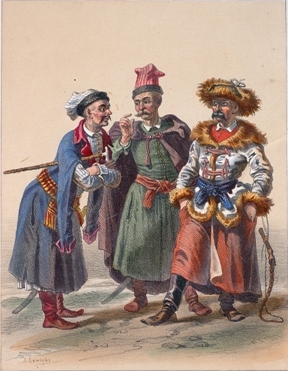
‘In short, the Genius of the Polish Nation, and the whole Frame of their Constitution, is entirely bent to Curb the King’s Power, and to secure their Laws, and Prerogatives, against the Incroaching Factions of Foreign Princes, or of their own Court-Party.’ The quoted excerpt is taken from Bernard O’Connor’s ‘The History of Poland’, wherein its author presented the political ideals of contemporary Polish gentry. Such assessment, giving priority to the nobles’ attempt to preserve or even increase their freedom vis-à-vis the king, was fully justifiable. Nobles perceived freedom in two ways; the negative, as freedom from oppression by the monarch, and the positive, as freedom from active participation in political activity. The noble understanding of ‘freedom’ referred to models reaching as far as the ancient Rome and also to the republican idea put forward by the outstanding thinker Niccolo Machiavelli at the turn of the 15th and the 16th centuries. He defined ‘freedom’ as ‘freedom to partake in political life’. He considered ‘virtue’, i.e. ‘endless and entire dedication to political life’, the key element indispensable for attaining freedom. It was precisely for the sake of preserving ‘the golden freedom’ that the political system of the Commonwealth made use of such elements as free election and liberum veto. From today’s perspective they often receive a critical assessment, as eventually they led to the collapse of the state. Meanwhile, gentry considered the liberum veto their ‘pupil of liberty’. ‘Liberty’ was guarded by law, its fundamental task being not so much the safeguarding of order as the protection of ‘liberty’. As observed by an expert, ‘an average nobleman did not mind that the law was ineffective as long as it preserved his privileges’. O’Connor understood very well this dependence, best expressed in the quote, ‘their Law is their King’. Writing about the ideals of nobles, he assigned the second place to political equality of all members of their class, ‘All the Gentry are equally Noble by their Birth… He [a gentleman] can pretend to all the greatest Employments and Offices in the Kingdom… He has moreover a Right to the Crown, if his Credit and Interest can procure it.’ But the political equality of all members of gentry was rather a demand than a fact. It was easier to move up the political career ladder being beautiful, rich and well-known rather than being ugly, poor and unknown. This rule existed long before television was invented. In practice, the highest ranking offices were assigned exclusively to the wealthiest of nobles, and the only Polish kings elected from the noble class, coming from outside a royal or princely background, were either members of famous families or enjoyed their strong support. This does not alter the fact that even the most powerful magnates had to seek gentry’s favours. After all, why would influential lords take in impoverished noblemen as domestic servants or fraternize with them at various neighbourly or legal gatherings and sessions of regional diets? The construction of the political system made all members of the noble class not so much equal as mutually interdependent. Moreover, nobles of the Commonwealth were convinced of their superiority over foreign counterparts. According to O’Connor, this conviction manifested itself at the end of the 17th century in that, ‘they neither value nor care for Titles of Honour, for they think the greatest they can have, is to be a Noble Pole, or Gentleman of Poland.’ It is praiseworthy to be proud of one’s homeland but soon the said conviction would take on a somewhat dangerous shape, namely that of xenophobia and certitude that the political system of the Commonwealth is superior over systems of other countries. This was one of the reasons why towards the end of the 18th century it proved so difficult to introduce necessary political and social reforms. The political ideals of nobles identified by O’Connor, namely freedom, equality and the conviction of superiority verged on arrogance, were echoed in other travellers’ comments, frequently unfavourable. Nevertheless, one important element of nobles’ ideology was overlooked by foreigners, including O’Connor. Admittedly, it would be unjust to blame them for this oversight, as even today the element in question is at odds with our conception of gentry. We frequently tend to perceive a ‘common’ nobleman as a drunk daredevil with a shaved scalp, ready for yet another duel and yet another war. Someone like Andrzej Kmicic and his comrades. This view was popularized not only by belles-lettres and films but also by publications of historians, headed by Władysław Łoziński’s ‘The Law and the Lion’. Indeed, the history of the Commonwealth was filled with wars, but it was the wars that developed the gentry’s tendency to seek peace. Nobles were highly reluctant to aggressive military conflicts. The only form they accepted were defensive wars in the name of the Commonwealth, their freedom and, especially in 1650–1800, in the name of the Catholic religion. Such wars could be fought not only against external enemies but even against domestic threats, as exemplified by the Tarnogród Confederation (1715–1717) and the Bar Confederation (1768–1772). This penchant for pacifism partly stemmed from the manorial lifestyle adopted by gentry already in the 16th century. An ideal nobleman should live in the countryside, taking care of his own landed property and farm, and to communicate with ‘the outside world’ only when the common good was at stake. Passion for soldiering could not easily be matched with ‘a peaceful life, an affluent life.
We would like to inform that for the purpose of optimisation of content available on our website and its customisation according to your needs, we use information stored by means of cookies on the Users' end devices. You can control cookies by means of your Internet browser settings. Further use of our website without change of the browser settings means that you accept the use of cookies. For more information on cookies used by us and to feel comfortable about this subject, please familiarise yourselves with our Privacy Policy.
✓ I understand